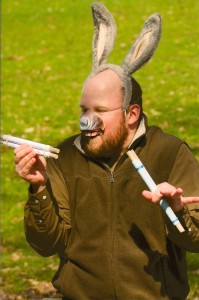
The Scroll has become the icon most closely associated with Unrehearsed Shakespeare. The theory goes: Elizabethan actors were given scrolls with their lines on them. Each line was preceded by a few syllables of the previous line. The actors stood onstage, waited for the four syllables that cued their line, then recited their line. It was the Rules of Unrehearsed Shakespeare that galvanized and inspired the performances. Any actor who wasn’t speaking spent his time memorizing his next cue and listening very, very carefully to everything that was being said. This was the epitome of what modern theatre students call active listening.
The frequency of debuts suggests that actors may have been given their scrolls very shortly before performances. Luckily, they had years of training to prepare them: it is entirely likely that an Elizabethan pro could grab a scroll, jump up onstage, and deliver an impressive and spectacularly unique performance.
We modern actors, however, do not have the years of daily training, nor the extensive apprenticeships, that Elizabethan actors had. Consequently, our actors are given their sides anywhere from one week to one month before a performance. Also, because our actors are not as intimately familiar with Shakespeare’s language as the Elizabethan pros were, one-on-one Text Sessions are held between each actor and the Director before the show opens.
The Director is the only member of the ensemble who is allowed to read the play being performed. Striving to recreate the conditions of Elizabethan performance means that the actors must be as unfamiliar with the play as possible. In their text sessions, the Director goes through each actor’s Sides, making sure the actor is aware of all the various meanings of every word, so he or she knows every possible thing the character might be saying. The result is that an industrious actor will be as familiar with his or her own dialog, all the potential implications and innuendos, as an Elizabethan pro.
